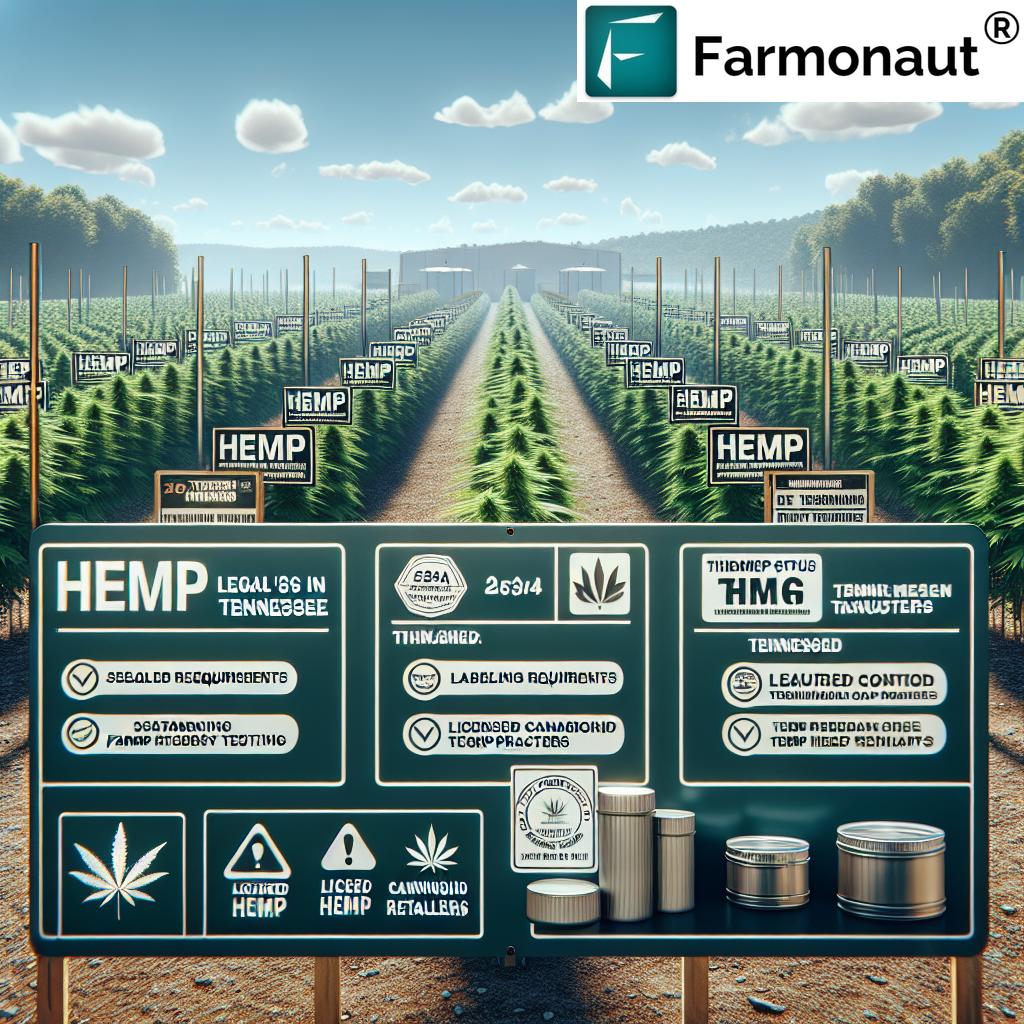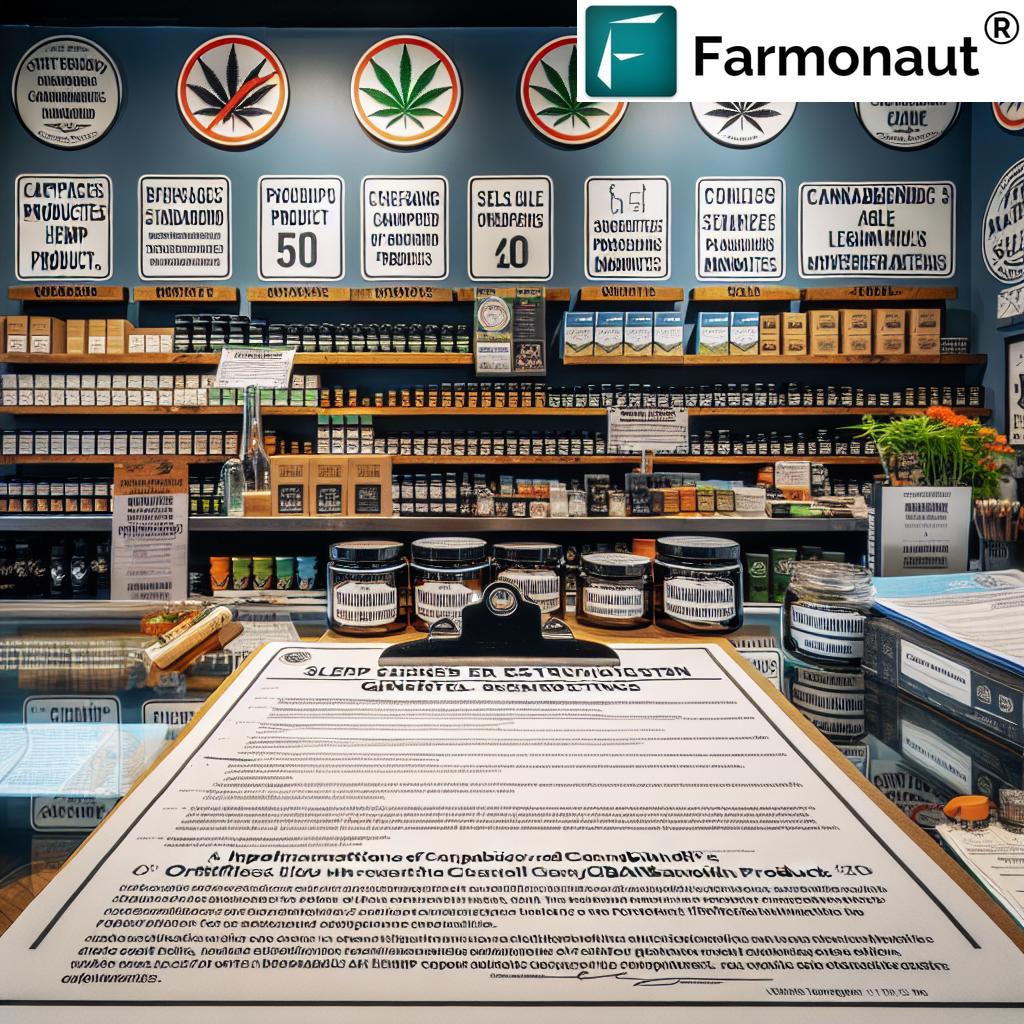Tennessee THCA Hemp: 7 Must-Know Law Changes in 2025
“Tennessee’s 2025 hemp law introduces 7 major regulatory changes impacting THCA production, sales, and compliance statewide.”
Overview: Tennessee Hemp Laws & THCA Legal Status in 2025
Tennessee’s hemp industry stands on the brink of transformation as sweeping regulatory changes come into effect in 2025. Pivotally, House Bill 1376 redefines the THCA legal status in Tennessee, introducing new age restrictions for hemp products, a comprehensive synthetic cannabinoid ban Tennessee, and substantial reforms across hemp industry regulations. These changes affect the sale, labeling, testing, and overall compliance landscape for farmers, manufacturers, retailers, and consumers. In this guide, we dissect the key regulatory requirements, establish insights for stakeholders, and offer a road map for navigating this evolving legislative landscape.
Why are these changes significant?
- Economic Impact: As THCA products once accounted for up to 60% of total sales revenue for some businesses, their prohibition is a game-changer for every sector, from agriculture and farming to retail.
- Legal Complexity: With the shift in regulatory oversight and the addition of new compliance hoops, confusion often remains for stakeholders, calling for clarity and proactive response.
- Public Health, Safety, and Access: Lawmakers’ stated intentions center on public safety, but these policies also engender concern for equitable access and reasonable industry participation.
Who should read this?
This comprehensive blog is essential reading for hemp farmers, agriculture professionals, manufacturers, licensed hemp retailers in Tennessee, industry advocates, and consumers that utilize or depend on hemp-derived cannabinoid products. Understanding the 2025 hemp legislation is critical for strategic planning and compliance.
Historical Context: Hemp Regulations in Tennessee
Understanding tennessee hemp laws demands a dive into the regulatory evolution from federal legalization to today’s state-level policies.
-
2018 Farm Bill: The federal government legalized hemp cultivation, formally defining hemp as cannabis plants containing less than 0.3% delta-9 tetrahydrocannabinol (THC) by dry weight.
This enabled states, including Tennessee, to establish their own hemp programs and regulations. - Initial Gaps: THCA, the acidic precursor to THC, was not specifically regulated initially. This omission led to the proliferation of THCA-heavy products in Tennessee’s retail and consumer markets.
-
July 2023 Amendments: Tennessee revised its laws to include explicit definitions and controls on various hemp-derived cannabinoids, now mentioning THCA. Notably:
- Age restriction: 21+ for purchase of all hemp-derived cannabinoids
- Sales tax: 6% on cannabinoid products
- Sampling in public spaces prohibited
- Violations classified as Class A misdemeanors
- Industry Impact: The regulatory tightening signaled increased scrutiny on cannabinoid production and sales, setting the stage for even stricter legislation in the years to follow.
The history of hemp law in Tennessee exemplifies the state’s ongoing attempt to balance economic opportunity, public health, and compliance with federal guidelines.
Recent Legislative Changes: House Bill 1376 and Beyond
On May 21, 2025, Governor Bill Lee signed into law House Bill 1376—a landmark piece of legislation that marks a sea change in tennessee hemp industry regulations. Here’s what every stakeholder in agriculture, farming, forestry, processing, and retail must know:
Key Provisions of the 2025 Law
-
Bans and Prohibitions: Effective January 1, 2026, the law bans both THCA and synthetic cannabinoids in products intended for sale.
See focus keyword: synthetic cannabinoid ban Tennessee. - Online Sales Prohibited: All online sales of hemp-derived cannabinoid products are strictly prohibited, restricting commerce to physical locations only.
- Regulatory Oversight Transfers: Regulatory authority for hemp cannabinoid products transfers from the Tennessee Department of Agriculture to the Tennessee Alcoholic Beverage Commission (ABC).
- Sales Restricted to Licensed Establishments: Only licensed hemp retailers in Tennessee with 21+ age restrictions or venues licensed by the ABC are permitted to sell these products.
- Compliance for Manufacturers and Wholesalers: New annual licensing fees of up to $5,000, stringent background checks, and requirements for testing, packaging, and labeling are enacted to ensure product safety and traceability.
- Display Rules for Retailers: Product displays must be behind physical barriers (e.g., counters), and all vending machines and self-checkout facilities are explicitly prohibited.
- Stiff Penalties: Violations can result in fines, immediate seizure of products, and revocation of licenses.
Unlock precision ag data: explore Farmonaut’s satellite imagery and weather API for Tennessee farmers and agribusinesses.
Visit the API developer documentation for integration use cases.
What Prompted These Legislative Changes?
- Growth in Unregulated Markets: Loopholes and regulatory gray areas allowed a flourishing market of THCA and synthetic cannabinoid products, raising concerns about public health and unmonitored access, especially among young adults.
- Alignment with National Trends: Across the U.S., states are tightening controls on hemp-derived cannabinoids to address intoxicating product concerns and federal-state law alignment.
When Do the Changes Take Effect?
- Primary provisions effective January 1, 2026
- Transitional compliance period begins immediately after law passage to allow industry adaptation
7 Must-Know Law Changes for Tennessee’s Hemp Industry in 2025
Let’s break down the specific seven law changes that every stakeholder should understand:
-
Ban on THCA Sales:
Starting in 2026, the sale of all THCA-rich products is explicitly prohibited, regardless of their delta-9 THC content. This measure closes the loophole whereby THCA-heavy flower products were sold as legal hemp. -
Synthetic Cannabinoids Ban:
The state enacts a total prohibition on the manufacture, distribution, or sale of synthetic cannabinoids in any form, aiming to root out potentially harmful, lab-altered products. -
No Online Sales:
All sales transactions for hemp-derived cannabinoids must occur in person at licensed retail establishments. E-commerce and shipping across state lines are now illegal for these products in Tennessee. -
Strict Age Restrictions:
Only individuals aged 21 and over may legally purchase these hemp-derived cannabinoid products. This change aligns with the approach to recreational substances such as alcohol and tobacco. -
Regulatory Authority Shift:
The department of oversight moves from the Department of Agriculture to the Alcoholic Beverage Commission (ABC), bringing cannabinoid oversight under the same umbrella as alcohol regulation. -
Enhanced Licensing and Testing Requirements:
Significant new compliance hurdles for manufacturers and wholesalers: background checks, record-keeping, annual licensing & fees, and cannabinoid testing standards for all products. -
Controlled Retail Displays and No Vending Machines:
Hemp-derived cannabinoids may be displayed only behind counters or locked cabinets in authorized locations. Vending machines and self-checkout are banned.
Regulatory Changes Comparison Table
For a clear understanding, use this table to compare the 7 main regulatory changes, their previous status, what the 2025 regulation introduces, estimated industry impact, and the core compliance requirement for each.
| Law/Regulation | Pre-2025 Status | 2025 Change Summary | Estimated Impact | Compliance Requirements |
|---|---|---|---|---|
| THCA Sale Ban | Allowed if <0.3% delta-9 THC; THCA not directly regulated. | All THCA-rich product sales banned, regardless of conversion potential. | High (Revenue, product lines, farming practices.) | Immediate removal of THCA products; update product lineups. |
| Synthetic Cannabinoids Ban | Permitted if containing <0.3% delta-9 THC. | Manufacture/sale/distribution prohibited statewide. | High (Impacts product innovation and sourcing.) | Cease all synthetic cannabinoid operations. |
| Online Sales Prohibited | Allowed for most hemp-derived cannabinoids. | All online transactions for these products banned. | Moderate–High (Reduced consumer access, e-commerce losses.) | Switch to in-person, age-gated retail only. |
| Age Restrictions Raised | 21+ for some products since July 2023; loosely enforced pre-2023. | Strict 21+ age minimum, enforced at point of sale; violations penalized. | Moderate (Decreased under-21 usage, retail adaptation.) | Update ID systems, enforce age checks. |
| Regulatory Oversight (ABC) | Tennessee Department of Agriculture regulation. | Shifts oversight, licensing, and enforcement to ABC. | Moderate (Policy/inspection changes, new rules.) | Register/license with ABC, follow ABC rulebook. |
| Licensing & Testing Standards | Low/variable requirements (fee, limited testing, less frequent checks). | Background checks, higher annual fees, mandatory third-party testing, packaging standards enforced. | High (Cost increases, process overhauls.) | Implement full compliance programs, pay fees, document records. |
| Retail Display & Vending Rules | Front-of-store, self-checkout, and vending machines allowed. | All products behind the counter/barrier; no vending/self-checkout. | Moderate (Store layout revision, consumer access limits.) | Renovate store fronts; staff retraining. |
Compliance Challenges for Stakeholders under New Hemp Regulations
From farmers to licensed hemp retailers in Tennessee, each stakeholder must confront new compliance hurdles as they adapt to the post-2025 legal environment.
-
Farmers:
- Hemp cultivators, especially those growing for THCA flower, face potential revenue collapse, as up to 60% of sales may disappear with the new ban.
- Farmers must pivot to alternative crops or hemp products that are compliant with new THC and cannabinoid thresholds.
-
Manufacturers:
- New licensing application processes, fees, and background checks are required.
- Comprehensive record-keeping, updated cannabinoid testing standards, and batch documentation are now mandatory.
-
Retailers:
- Conversion or closure of convenience stores and unauthorized retail outlets that fail to meet 21+ entry limitations or aren’t ABC licensed.
- Store redesigns for behind-counter display, no self-checkout lanes, and no vending machines—all enforced by ABC inspections.
-
Consumers:
- For those relying on THCA or synthetic cannabinoids, product access becomes severely limited.
- Increased travel to licensed, age-gated establishments may impede timely and affordable access, especially in rural communities.
Key Compliance Responsibilities by Role
- Ensure strict adherence to new THC, THCA, and cannabinoid bans
- Register and license with ABC, not just the previous Department of Agriculture
- Implement robust cannabinoid testing standards and maintain certification records
- Adapt store presence and product display strategies as per new rules
- Educate staff and customers on age limits and purchase rules
Impact of Hemp Legislation on Farmers, Retailers, and Consumers
A. The Impact on Farmers and Growers
The ban on THCA-rich hemp flower presents a critical blow to Tennessee growers. Farmers who invested in genetics and cultivation methods optimized for high THCA content are now forced to consider significant overhauls of their operations:
-
Financial Fallout:
Industry organizations estimate potential losses up to 60% of revenue for some farms, leading to the need for rapid diversification or even crop destruction. -
Strategic Pivot:
Consider shifting to fiber, grain, or low-THCA cultivars; learn new compliance requirements; adapt to traceability expectations; and explore alternative supply chains.
B. The Impact on Retailers and Manufacturers
-
Cost of Compliance:
Licensing, fees, advanced testing, packaging standardization, store renovations—all mean higher compliance costs and risks, especially for independent and small retailers. -
Reduced Retail Channels:
Most convenience stores and general retail outlets are removed from the circle of authorized sellers, restricting retail opportunities and concentrating market power among those who gain ABC licenses.
C. The Impact on Consumers
-
Limited Access & Higher Prices:
Consumers must now travel further and purchase from age-restricted locations, likely facing both higher prices and narrower product selections. -
Therapeutic Gap:
Those seeking non-intoxicating, therapeutic THCA flower may lose access to products considered crucial to their well-being.
Future Trends & Recommendations in Tennessee Hemp Regulations
Emerging Trends in Cannabinoid Legislation Nationwide
- States tightening their definitions of legal cannabis and hemp, increasingly barring or strictly regulating synthetic and “converted” cannabinoids.
- Increased importance of third-party lab testing, robust traceability systems (especially blockchain-powered), and transparent supply chains.
- Growing consumer demand for clear labeling and reliable product information.
Recommendations for Tennessee Stakeholders
- Engage with Associations: Join organizations such as the Tennessee Growers Coalition for real-time updates and advocacy.
- Invest in Compliance Infrastructure: Digital compliance management systems, product traceability, and automated record-keeping will become keys to survival.
- Diversify Product Lines: Evaluate the opportunity to transition toward compliant hemp products (grain, fiber, industrial, low-THCA cultivars).
- Stay Ahead of Federal Moves: National legislation and FDA posture could shift, so remain agile as state laws evolve.
How Farmonaut Empowers Agriculture in Regulatory Environments
We at Farmonaut are committed to making precision agriculture and regulatory compliance affordable and accessible for every farmer and agribusiness operator—especially in dynamic, rapidly changing legislative environments such as Tennessee’s hemp sector.
- Satellite Crop Health Monitoring: We provide real-time NDVI and crop health analytics, aiding compliance reporting—vital for Tennessee hemp growers transitioning crop types or requiring evidence of legal cultivation practices.
- Jeevn AI Advisory System: Our personalized advisory tools empower farmers with weather insights, horticultural best practices, and regulatory alerts.
- Blockchain-Based Product Traceability: Secure product tracking from farm to shelf ensures supply chain transparency, fulfilling labeling, testing, and audit requirements demanded by new Tennessee regulations.
- Fleet & Resource Management: Optimize distribution logistics, field operations, and compliance documentation through advanced fleet tracking solutions.
- Carbon Footprinting Tools: Address sustainability and environmental compliance with our carbon monitoring solutions—critical for farmers balancing new legal and ESG demands.
- Accessible App & API Integrations: All our services are available on Android, iOS, and web platforms, plus API for large-scale or developer integrations.
Our platform ensures that Tennessee’s farm and hemp industry stakeholders stay ahead in compliance, operational efficiency, and regulatory adaptation.
FAQ: Tennessee THCA Hemp and 2025 Law Changes
Under House Bill 1376, the sale of THCA products is banned statewide as of January 1, 2026. Cultivation for THCA-rich hemp products is also effectively prohibited.
Q: Can I still buy hemp-derived cannabinoid products online in Tennessee?
No. The new law prohibits all online sales of hemp-derived cannabinoids and related products. Only in-person purchase at licensed, age-restricted establishments is allowed.
Q: What is the legal age for purchasing hemp products after the new legislation?
The minimum legal age is 21, strictly enforced at the point of sale, effective January 2025.
Q: What are the new requirements for hemp product labeling in Tennessee?
Product packaging must comply with clear, state-mandated labeling requirements including hemp content, cannabinoid types, batch numbers, and laboratory results in line with the cannabinoid testing standards and traceability laws.
Q: How does the synthetic cannabinoid ban affect Tennessee’s hemp businesses?
Manufacturing, distribution, and sale of all synthetic cannabinoids are banned, requiring immediate cessation and adaptation of product lines.
Q: Who now regulates licensed hemp retailers in Tennessee?
The Tennessee Alcoholic Beverage Commission (ABC) is the new regulatory body for licensing, inspection, and enforcement related to hemp-derived cannabinoids.
Q: Can I still buy hemp products at convenience stores?
No. The law removes convenience stores and general retail outlets from the list of authorized sellers. Only age-gated or ABC-licensed establishments may sell.
Q: What penalties apply for non-compliance?
Violations can result in product seizure, fines, misdemeanors, and loss of licensing for both manufacturers and retailers.
Q: How can Tennessee hemp farmers stay compliant and minimize risk?
Regularly review regulatory updates, build out reliable compliance programs, leverage traceability or blockchain solutions, and consult with industry associations or agricultural technology platforms like Farmonaut for up-to-date compliance reporting and monitoring tools.
Conclusion: Navigating Tennessee’s 2025 THCA Hemp Law Changes
Tennessee’s sweeping reforms to hemp-derived cannabinoid regulations and the THCA legal status in Tennessee represent one of the most consequential shifts for the southern agricultural and cannabinoid product markets. Whether you are a farmer recalibrating operations, a retailer reformatting your business, or a consumer in search of compliant and safe products, proactive adaptation is vital.
Staying informed, leveraging advanced monitoring and traceability solutions, and aligning with the new regulatory reality are imperative for continued success in Tennessee’s hemp landscape.
For those navigating these changes, Farmonaut provides industry-leading tools for satellite monitoring, regulatory reporting, crop advisory, and traceability—empowering agriculture stakeholders to thrive amidst evolving compliance demands.















